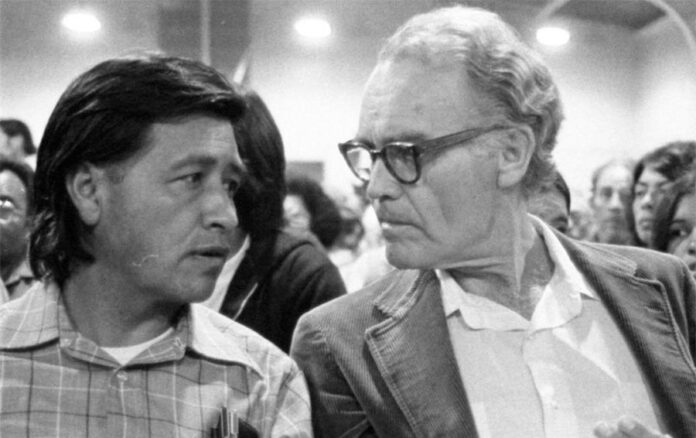Most people have heard of César Chávez and Dolores Huerta, but not many remember that it was Fred Ross Sr. who discovered both César and Dolores and helped them become the great leaders who dared to dream beyond the moon.
Fred Ross began his organizing work in the labor camps so vividly described by author John Steinbeck. Later, the renowned community organizer Saul Alinsky asked him to go to California to organize the growing Mexican-American population.
When Ross moved to San Jose, California, he met a tough new barrio leader named César Chávez. That night, in his agenda, he wrote, “I think I just met the right man” for the organizing work they would undertake with the Community Service Organization (CSO). Soon, Fred met Dolores Huerta and convinced her to join their team in organizing the CSO office. They focused on citizenship and voter registration.
In 1962, Chávez and Huerta both left the CSO to begin organizing a farmworkers’ union with no money—only a dream fueled by the financial and spiritual need of farmworkers seeking a better future for their children.
However, it was the Filipino workers, led by Larry Itliong, who first went on strike in Delano in 1965, prompting the new organization, led by César, to join them.
The Filipino workers’ community was well organized, and in the early days, union meetings and events took place in the Filipino Hall in Delano.
By then, Fred Ross had developed a house meeting model for educating and organizing workers. In those early years, the union paid organizers $5 a week and provided $10 for food. It was an incredibly exciting time.
I did not join the union until 1970, and at first, I did not understand what Ross, this elder white man, had to offer. Later, my fellow organizers and I learned from him—he understood our work, the obstacles we faced, and how we could do it better. Like many unions at the time, the UFW was male-led and male-oriented, but it was fortunate to have Dolores, who helped open many doors for women—not just in labor, but beyond.
Today, the UFW is led by another strong woman, Teresa Romero.
Spending mornings in Delano in 1971 with Fred, César, and Dolores was like a post-graduate course in community organizing and building power. Dolores Huerta, who turns 95 this year, left the UFW in 2002 to start the Dolores Huerta Foundation, which continues to use Fred’s house meeting format to organize people. Dolores will not stop working until she is called to that special house meeting in the sky.
César passed away in 1993, and in 1994, I rejoined the movement as the Founding Director of the César E. Chávez Foundation. By then, wages had doubled to $10 a week. I went back because the union had helped me leave behind drugs and violence, and it had taught me how to work with the poor.
At this time of year, we celebrate César’s birthday on March 31st and Dolores’ on April 10th. In honoring these dates, we should also celebrate all the women and men who dedicate their lives to making our world a better place.
History will remember César, Dolores, and all those who supported the grape and lettuce boycotts. And given the politics of today, Dolores reminds us: WE GOT THE POWER! The power of the people.







